On October 15, the University of Tokyo (UTokyo) held the Symposium Commemorating the University of Tokyo Statement of Diversity and Inclusion: Current situation and future of diversity initiatives with University Vice President Yujin Yaguchi (Global Education) acting as emcee.
In his opening remarks, University President Teruo Fujii explained that Diversity and Inclusion (D&I) is a vital driving force for UTokyo, and all stakeholders must deepen their understanding of this matter.
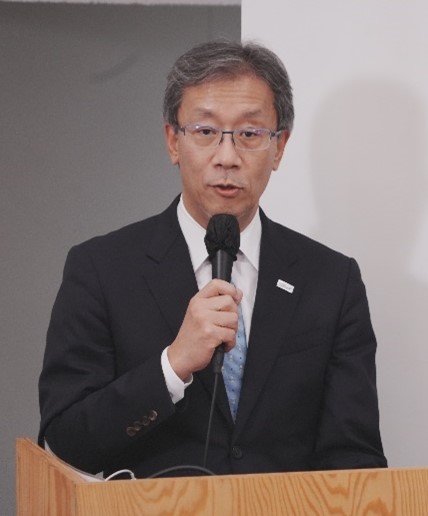
In Part 1 of the symposium, titled “Introduction to the University of Tokyo Statement on Diversity & Inclusion,” Akira Takano, professor at the Center for Research on Counseling and Support Services, explained the background and the philosophy of the D&I statement.
This was followed by Mariko Ogawa, Deputy Director of the Office for Gender Equality and Project Associate Professor at the Graduate School of Interdisciplinary Information Studies, who explained how UTokyo’s level of gender equity and diversity, including the ratios of female students, female researchers, and international students, is low compared to top overseas universities. She emphasized the importance of visualizing this reality using data.
Part 2 of the symposium was a panel discussion, titled “Toward the realization of the D&I statement—learning from various perspectives and experiences.” The panelists were UTokyo stakeholders in varying positions with diverse experiences, and Madoka Nakano, a project researcher at the Office for Gender Equality, moderated the session.
During the discussion, Jonathan Woodward, professor at the Graduate School of Arts and Sciences in charge of the PEAK English education program at the Komaba campus, pointed out the importance of improving transparency in a country like Japan, which has a culture of behind-the-scenes maneuvering. Speaking from experience, he gave an example of how the same faculty meeting, consisting of both Japanese and international faculty members, could result in different contributions depending on whether the meeting was conducted in Japanese or English. He said this can inhibit open discussion as some members may not be confident that they fully understand the contents of the discussion, which reduces their confidence in speaking out. He highlighted the importance of ensuring that diversified members' voices are heard.
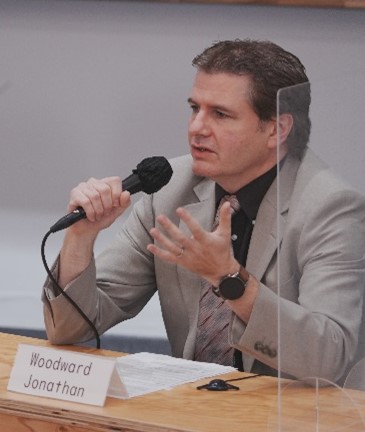
Appointed this April, Misook Lee, associate professor at the Graduate School of Interdisciplinary Information Studies, recalled how her minority status as female and Korean made her invisible on numerous occasions when she first came to Japan as a graduate student. She argued that those who are in positions to lead the D&I movement, many of whom are female and international faculty, are under a fixed-term contract, which makes it difficult for them to speak out. She also spoke of Seoul University’s diversity committee and human rights center and gave examples of its autonomous student bodies and faculty networks being vocal in the D&I conversation.
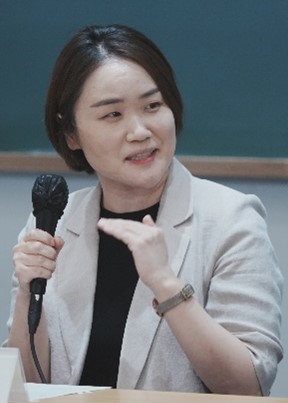
Speaking on the learning opportunities for students with disability, Professor Takeo Kondo at the Research Center for Advanced Science and Technology explained that in settings where students with disability are excluded, they have to speak up and negotiate for themselves. He argued that these conversations between students with disability and an organization often fail because the students lack knowledge of the organization’s culture, rules, or practices. Their voices often go unheard, no matter how hard they are making effort/be. Professor Kondo emphasized the need to have advocates within the organization who will argue their cases with them.
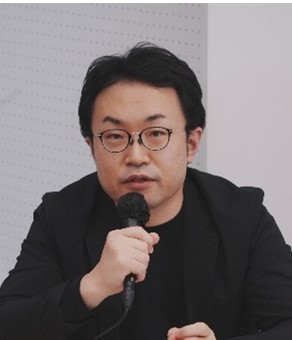
Mariko Hoshi cofounded and currently serves as COO of Job Rainbow Co., Ltd after graduating from the Graduate School for Law and Politics, Faculty of Law to help the LGBTQ student community with their job search. She explained that unlike overseas, where LGBT events receive large donations from central and local governments, most LGBT events in Japan are sponsored by corporations. This can lead to messages that are company-focused rather than D&I-focused. She called on UTokyo to play a visible role in promoting D&I in Japan.
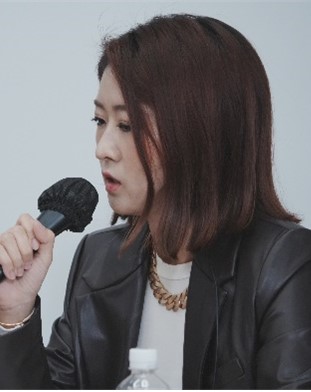
University Executive Vice President Hiroaki Aihara explored the issues with the current student composition from an enrollment perspective and called for a long-term solution. He pointed out that the university must review the undergraduate entrance exam system and how there is a potential bias when male faculty members create the exams. He suggested increasing the quota of exam candidates recommended by their high schools from 100 to 300 and increasing the proportion of international students to one-third of the total undergraduate population. He believes that these steps will make UTokyo more open and diverse.
Responding to the panelists, Executive VP Aihara commented that UTokyo should be a proactive and visible participant, internally and externally, in understanding and resolving the D&I issue. He proposed setting up a Diversity, Equity, and Inclusion (DEI) research center and working with domestic and international institutes. He argued that the university should provide the human and financial resources required to set up the research center if we want to see the university evolve.
The symposium concluded with the following message from Executive Vice President Kaori Hayashi: “Not only do we need to have more females, sexual minorities, international students, and people with disability in our university community, but we also must be aware that there are minorities among us who cannot speak up for themselves. We must respond to these issues with a greater sensibility and create a highly receptive campus that resonates well with society. We need to have more advocates and allies within UTokyo and utilize our diverse insights to ensure our university is a place of genuine education. Through such changes, I believe we will see more students graduating from UTokyo who are ready to lead their generation and the next.”

In his opening remarks, University President Teruo Fujii explained that Diversity and Inclusion (D&I) is a vital driving force for UTokyo, and all stakeholders must deepen their understanding of this matter.

In Part 1 of the symposium, titled “Introduction to the University of Tokyo Statement on Diversity & Inclusion,” Akira Takano, professor at the Center for Research on Counseling and Support Services, explained the background and the philosophy of the D&I statement.
This was followed by Mariko Ogawa, Deputy Director of the Office for Gender Equality and Project Associate Professor at the Graduate School of Interdisciplinary Information Studies, who explained how UTokyo’s level of gender equity and diversity, including the ratios of female students, female researchers, and international students, is low compared to top overseas universities. She emphasized the importance of visualizing this reality using data.
Part 2 of the symposium was a panel discussion, titled “Toward the realization of the D&I statement—learning from various perspectives and experiences.” The panelists were UTokyo stakeholders in varying positions with diverse experiences, and Madoka Nakano, a project researcher at the Office for Gender Equality, moderated the session.
During the discussion, Jonathan Woodward, professor at the Graduate School of Arts and Sciences in charge of the PEAK English education program at the Komaba campus, pointed out the importance of improving transparency in a country like Japan, which has a culture of behind-the-scenes maneuvering. Speaking from experience, he gave an example of how the same faculty meeting, consisting of both Japanese and international faculty members, could result in different contributions depending on whether the meeting was conducted in Japanese or English. He said this can inhibit open discussion as some members may not be confident that they fully understand the contents of the discussion, which reduces their confidence in speaking out. He highlighted the importance of ensuring that diversified members' voices are heard.

Appointed this April, Misook Lee, associate professor at the Graduate School of Interdisciplinary Information Studies, recalled how her minority status as female and Korean made her invisible on numerous occasions when she first came to Japan as a graduate student. She argued that those who are in positions to lead the D&I movement, many of whom are female and international faculty, are under a fixed-term contract, which makes it difficult for them to speak out. She also spoke of Seoul University’s diversity committee and human rights center and gave examples of its autonomous student bodies and faculty networks being vocal in the D&I conversation.

Speaking on the learning opportunities for students with disability, Professor Takeo Kondo at the Research Center for Advanced Science and Technology explained that in settings where students with disability are excluded, they have to speak up and negotiate for themselves. He argued that these conversations between students with disability and an organization often fail because the students lack knowledge of the organization’s culture, rules, or practices. Their voices often go unheard, no matter how hard they are making effort/be. Professor Kondo emphasized the need to have advocates within the organization who will argue their cases with them.

Mariko Hoshi cofounded and currently serves as COO of Job Rainbow Co., Ltd after graduating from the Graduate School for Law and Politics, Faculty of Law to help the LGBTQ student community with their job search. She explained that unlike overseas, where LGBT events receive large donations from central and local governments, most LGBT events in Japan are sponsored by corporations. This can lead to messages that are company-focused rather than D&I-focused. She called on UTokyo to play a visible role in promoting D&I in Japan.

University Executive Vice President Hiroaki Aihara explored the issues with the current student composition from an enrollment perspective and called for a long-term solution. He pointed out that the university must review the undergraduate entrance exam system and how there is a potential bias when male faculty members create the exams. He suggested increasing the quota of exam candidates recommended by their high schools from 100 to 300 and increasing the proportion of international students to one-third of the total undergraduate population. He believes that these steps will make UTokyo more open and diverse.
Responding to the panelists, Executive VP Aihara commented that UTokyo should be a proactive and visible participant, internally and externally, in understanding and resolving the D&I issue. He proposed setting up a Diversity, Equity, and Inclusion (DEI) research center and working with domestic and international institutes. He argued that the university should provide the human and financial resources required to set up the research center if we want to see the university evolve.
The symposium concluded with the following message from Executive Vice President Kaori Hayashi: “Not only do we need to have more females, sexual minorities, international students, and people with disability in our university community, but we also must be aware that there are minorities among us who cannot speak up for themselves. We must respond to these issues with a greater sensibility and create a highly receptive campus that resonates well with society. We need to have more advocates and allies within UTokyo and utilize our diverse insights to ensure our university is a place of genuine education. Through such changes, I believe we will see more students graduating from UTokyo who are ready to lead their generation and the next.”






